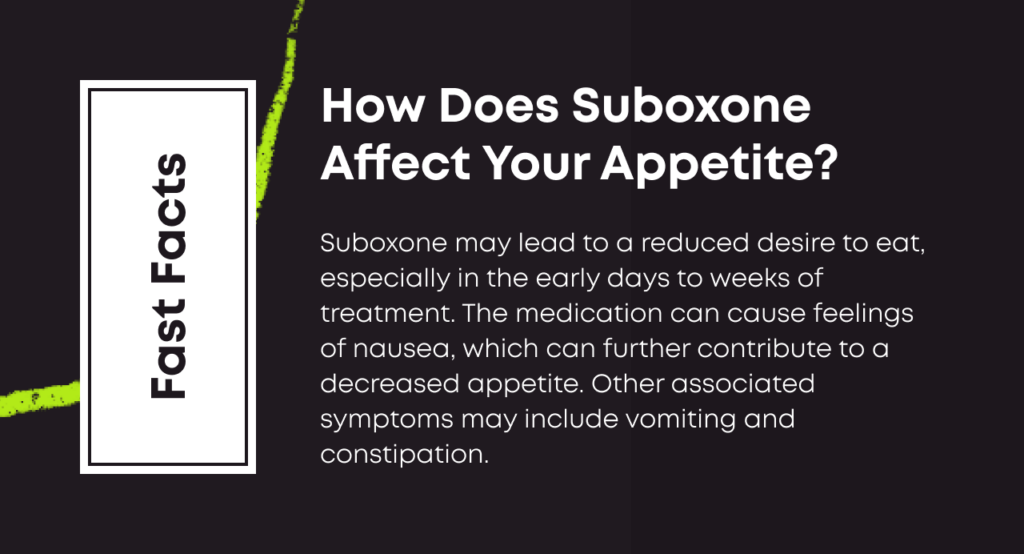%20(1).jpg)
Suboxone can sometimes affect a person’s appetite, or even produce nausea or vomiting. While this side effect is frustrating, it is usually temporary and not dangerous to your health. Moreover, it often improves as your body gets used to the therapy.

Suboxone is a medication that combines buprenorphine and naloxone. Of these two drugs, buprenorphine is more likely to cause changes to appetite.
Particularly at first, Suboxone can cause a few symptoms related to the gastrointestinal system, including, decreased appetite, nausea, vomiting, or constipation [1]. This may make someone’s appetite decrease initially, particularly in the first days to weeks of therapy. However, these symptoms, if they do occur, tend to improve pretty rapidly as the patient’s body gets used to the medication.
Long term, there is not much evidence that Suboxone has a significant impact on appetite. [1] Similarly, most patients do NOT experience noticeable changes in weight while on Suboxone.
However, everybody is different. Some patients may notice that their appetite is different – either decreased or increased – while on Suboxone. Some may also experience either weight loss or weight gain, depending on how their eating habits change while on Suboxone.
It depends – while nausea or decreased appetite from Suboxone is usually a short lived and/or minor side effect, some people may have ongoing symptoms even after a week or two of therapy that may make the therapy intolerable.
Like any side effect associated with medication, the pertinent question is whether the benefits of Suboxone outweigh its downsides.
Suboxone is largely considered a safe, effective OUD treatment. But it also isn’t for everyone, and some people who try it may not find the drug beneficial enough to warrant tolerating unpleasant side effects.
If this is the case, talk to your provider: there may be other treatments that can be offered to mitigate these side effects such as anti-nausea medications. If not, there may be other treatments for OUD that you can use instead of Suboxone.
In conclusion, decreased appetite or stomach upset may be an early, or in rare cases, a long term side effect of Suboxone. The benefits may outweigh the risks. Talk to your doctor if this is a side effect you experience so that you can work together on making therapy as tolerable for you as possible.
%20(1).jpg)
Elena Hill, MD; MPH received her MD and Masters of Public Health degrees at Tufts Medical School and completed her family medicine residency at Boston Medical Center. She is currently an attending physician at Bronxcare Health Systems in the Bronx, NY where she works as a primary care physician as well as part time in pain management and integrated health. Her clinical interests include underserved health care, chronic pain and integrated/alternative health.
Our science-backed approach boasts 95% of patients reporting no withdrawal symptoms at 7 days. We can help you achieve easier days and a happier future.
Get Startedor book an enrollment call